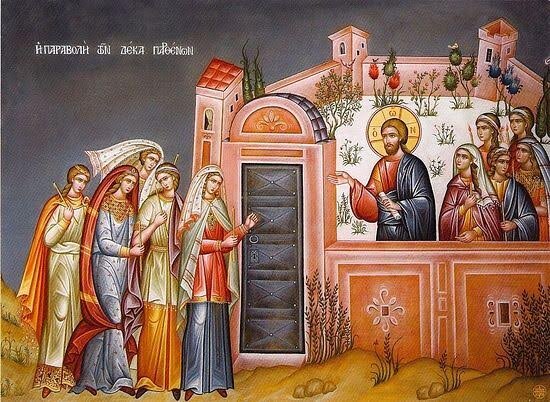Reflection on Today’s Gospel - Mt 25:1-13
What this oil symbolized, which the foolishvirgins lacked, so that their lamps went out, and they themselves were not allowed into the wedding feast? In general, let us note that these virgins did nothing wrong. They only lacked something very important, without which they could not be accepted into the community of the saved.
The Lord Jesus not only warned in this parable that not all justice would open the gates of eternal life for us. "Unless your righteousness surpasses that of the scribes and Pharisees, you will not enter into the kingdom of heaven" (cf. Mt 5:20).
I think it is already clear what this oil is in the lamps of the wise virgins, and what oil the unreasonable ones lacked. It is God's love, it is sanctifying grace, it is an attitude of entrusting oneself to God.
Many of the greatest teachers of the Church - starting with Origen, Jerome and Gregory - connected today's parable with human senses. Our senses, Origen used to say, are either all five are wise or all five are foolish. For example, our eyes, if they are wise, try to notice our neighbors, their needs, troubles and joys. Our ears, if they are wise, try to listen to their neighbor and not overwhelm him with our own speech and our selfishness; they also try to listen to the word of God. Our touch, if it is wise, tries to create spaces of mutual kindness.
In short, the point is that each of our senses has the capacity to open to what is the spiritual. We are bodily, but our bodies have such a wonderful ability to serve the spirit as a tool.
In this way, we can and should praise God with our senses.
A short story entitled "About two monks and the afterlife"
Two monks (pious and wise) agreed that the one who dies first will let the other know if the afterlife looks just as they imagined it to be; or otherwise. The report was to be short and to the point, and it was to contain only one word: either "totaliter" ("completely yes") or "aliterd" ("different"). After the death of the first of them comes the message: "Totaliter aliterd" ("completely different!").
In practice
"Memento mori - Remember about death". This well-known Camaldolese call should probably be the call of every Christian. We should be ready to stand before Christ at any moment. With the burning lamps of our good deeds. This is what true wisdom is all about.
- A Christian must not be content with a glorious past, but here and now he/she must make choices that are in accordance with the Gospel.
- A Christian cannot postpone the moment in which to live faithfully according to the Gospel. Because he/she may not reach for this moment.
- A Christian must remember that adherence to the Gospel is true wisdom. Many short cuts are offered to Christians today. Thinking that a good end justifies the means that lead to it. In fact, evil means can cause great scandal and they bring more harm to God's cause than a good goal achieved with their help.
- Living the Gospel is not naivety. This is real wisdom looking at the ultimate consequences of our own actions.
How many problems in the Church could have been avoided if the Gospel had been faithfully followed?
Until Tomorrow
fr. george


